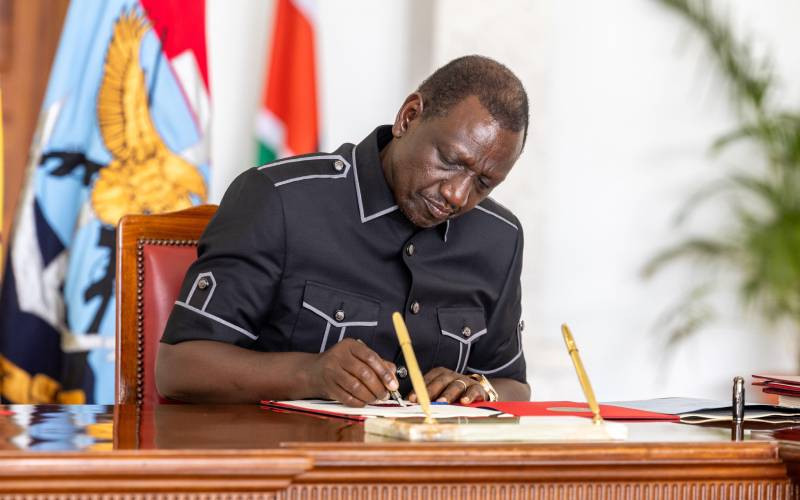To kill boredom, you may have found yourself watching those daytime Nigerian or oga movies where witchcraft, treachery, fraud, betrayal and abomination are inevitable. You must have come across one where one character poisons a drink but due to some confusion he or she ends up drinking the killer drink before collapsing while frothing in the mouth.
In the village, boys had some home-made boomerang; something you throw up the skies and move away from the spot because it would come back and hit you right on the scalp
In politics too, history is replete with cases where our politicians have ended up in the trap they help set up for someone else. The best involve two Nyayo Era kingpins in 1982.
Mr Mwai Kibaki and Mr Charles Njonjo. One moved the motion that made Kenya effectively a one-party State, closing the only window in the Constitution that gave room for germination of a second, third or even more political parties. Then history caught up with the two gentlemen.
When Njonjo was linked to attempts to topple President Moi, he was dragged through the humiliation of a public inquiry at the end of which he and his cohorts were expelled from Kanu and had nowhere to go.
Several years later, Kibaki, who had likened the removal of Kanu from power to attempting to cut down a mugumo tree using a razor blade, announced he had formed his own party. He had thrown himself into the hard life of Opposition leaders in Kenya, then treated as sell-outs and non-patriots who would be tear-gassed at will by police.
Yes, by then, theoretically, the constitutional bulwark placed on the way of political pluralism had been removed. State machinery had also tilted the playing field towards its side.
You may have heard what former Prison Commandant Martin Shikuku used to talk about. One day after he had left the command post, he ended up in jail and once breakfast was served he asked for sugar, and during lunch he requested for salt. He was simply told the rules he had helped uphold were still in place!
Shikuku, ever a story-teller and rib-cracker, used to talk about the Office of the President minister who condoned police shoot-to-kill crimes. But one day his brother was ordered to stop by police somewhere around KenCom House but walked on. The police opened fire. But the family later dropped a shocker: he was deaf!
The laws the Jubilee Government has been cooking in the smoky kitchen to be doled out to police, intelligence units and other government organs to use in the war against terror fit perfectly with the analogies you have just trawled through. They are draconian in the sense that we have smouldered the civil rights guaranteed Kenyans most generously in the Constitution on the altar of fighting Al-Shabaab. Privacy will be trampled upon in the name of monitoring and pursuing terror suspects.
We have ignored the corruption, ineptitude and incompetence of our security agencies that weaken the security ring they should throw around us, and decided to turn Kenya into a police State, where for example hotels will be submitting lists of who slept in their hotel rooms, in ones and twos, as you may guess.
Then they suggest in the new terror laws that if arms are found in your mosque or church, the lead cleric could get 20 years in jail. It talks less about the rule of natural justice that demands evidence linking a suspect to crime.
Police used to arrest guys critical of government and keep them in the cells for as long as they wanted. That was changed because it was abused and transformed into a tool to dehumanise and punish government critics. Now someone in Jubilee thinks that was a bad idea and the former should be revived.
In the same breath we know what Special Branch did; a bunch of characters, adults you must know, who reported to work with needles and pliers to prick and squeeze the testicles of Government critics labelled dissidents and saboteurs.
Stay informed. Subscribe to our newsletter
Now the same chaps have convinced the Jubilee Executive that the answer to finding and killing terrorists is to give National Intelligence Service powers to arrest. After they arrest, you know what they will do; they will not put you up in a three-star hotel and pamper you with food and drinks so that you may open up on what you know!
The laws are many and smack of someone’s nostalgia for the days gone by when serikali ilikuwa serikali (when government was government!), and where the President on his own decided who was to head the police.
Actually, when you read the clauses in the proposed law, you won’t miss the lingering feeling that those leading Kenya today, with the exception of William Ruto, at heart belonged to the ‘No’ camp in the 2010 referendum.
That is why it unashamedly says somewhere media houses will have to get permission from police on what kind of pictures to carry after a terror attack, and furthermore, we risk Sh5 million fine if in the eyes of the police, we publish a story that undermines terror investigations.
Americans paid dearly for the civil liberties Mr George Bush and his version of Republican Guard did, including most dehumanising torture tactics for terror suspects, in the name of stopping Osama Bin Laden and Al-Qaeda.
He drove fear of Osama into the hearts of Americans, then used that as a decoy to do terrible things with the laws. That my friends is probably what is happening in Kenya.
Al-Shabaab has given someone a small window to curtail certain freedoms but for very different reasons. Yes, we must fight terrorists at all costs, but not by turning Kenya into one big prison where the Executive holds the key and is perpetually peeping at what we are doing, may be right up to the ablution stage, from the keyhole!
The sweet fact is that in the end if we allow these clauses to sail through, we shall all cry because laws last longer than us and will catch up with us when we shall no longer have the veneer of incumbency and trappings of office cushioning us.
 The Standard Group Plc is a
multi-media organization with investments in media platforms spanning newspaper
print operations, television, radio broadcasting, digital and online services. The
Standard Group is recognized as a leading multi-media house in Kenya with a key
influence in matters of national and international interest.
The Standard Group Plc is a
multi-media organization with investments in media platforms spanning newspaper
print operations, television, radio broadcasting, digital and online services. The
Standard Group is recognized as a leading multi-media house in Kenya with a key
influence in matters of national and international interest.
 The Standard Group Plc is a
multi-media organization with investments in media platforms spanning newspaper
print operations, television, radio broadcasting, digital and online services. The
Standard Group is recognized as a leading multi-media house in Kenya with a key
influence in matters of national and international interest.
The Standard Group Plc is a
multi-media organization with investments in media platforms spanning newspaper
print operations, television, radio broadcasting, digital and online services. The
Standard Group is recognized as a leading multi-media house in Kenya with a key
influence in matters of national and international interest.








